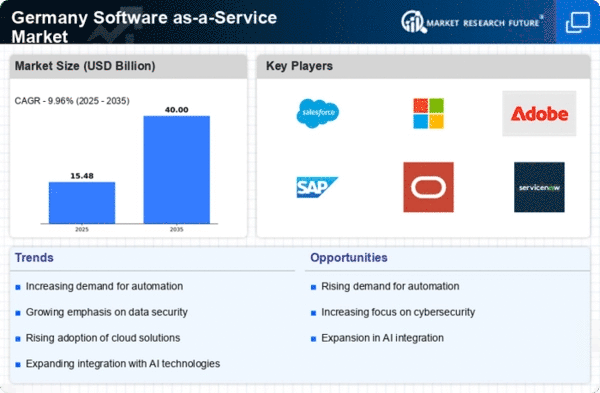Increased Focus on Cost Efficiency
Cost efficiency remains a pivotal driver for the software as-a-service market in Germany. Businesses are increasingly recognizing the financial advantages of SaaS solutions, which typically operate on a subscription model, allowing for predictable budgeting. In 2025, it is projected that the SaaS market will grow by approximately 15% annually, as organizations prioritize cost-effective alternatives to traditional software. This trend is particularly pronounced among small and medium-sized enterprises (SMEs) that may lack the resources for extensive IT infrastructure. By leveraging SaaS, these companies can access advanced technologies without the burden of significant upfront investments, thereby enhancing their competitive edge.
Emergence of Industry-Specific Solutions
The software as-a-service market in Germany is witnessing a trend towards the development of industry-specific solutions tailored to meet the unique needs of various sectors. As businesses increasingly seek specialized tools that address their operational challenges, SaaS providers are responding by offering customized applications. In 2025, it is expected that the demand for vertical SaaS solutions will grow by approximately 25%, particularly in industries such as healthcare, finance, and manufacturing. This trend not only enhances the functionality of SaaS offerings but also allows companies to streamline their processes and improve overall efficiency, thereby driving growth in the software as-a-service market.
Growing Demand for Remote Work Solutions
The Software as-a-Service Market in Germany experiences a notable surge in demand for remote work solutions. As organizations increasingly adopt flexible work arrangements, the need for cloud-based applications that facilitate collaboration and productivity rises. In 2025, it is estimated that around 70% of companies in Germany will implement remote work policies, driving the adoption of SaaS tools. This shift not only enhances employee satisfaction but also allows businesses to reduce overhead costs associated with physical office spaces. Consequently, the software as-a-service market is likely to expand as companies seek scalable solutions that can adapt to their evolving workforce needs.
Regulatory Compliance and Data Protection
The software as-a-service market in Germany is significantly influenced by the stringent regulatory landscape surrounding data protection and compliance. With the implementation of the General Data Protection Regulation (GDPR), businesses are compelled to adopt solutions that ensure data security and privacy. As of 2025, it is anticipated that compliance-related expenditures will account for nearly 20% of IT budgets in Germany. This regulatory environment drives organizations to seek SaaS providers that offer robust security features and compliance certifications, thereby fostering trust and reliability in the software as-a-service market. Consequently, companies that prioritize compliance are likely to gain a competitive advantage.
Advancements in Artificial Intelligence Integration
The integration of artificial intelligence (AI) technologies into software as-a-service applications is emerging as a key driver in the German market. Businesses are increasingly leveraging AI capabilities to enhance decision-making, automate processes, and improve customer experiences. In 2025, it is projected that AI-driven SaaS solutions will account for over 30% of the total SaaS market in Germany. This trend indicates a shift towards more intelligent and adaptive software solutions that can learn from user interactions and provide personalized recommendations. As organizations recognize the potential of AI to drive innovation and efficiency, the software as-a-service market is likely to experience substantial growth.
















